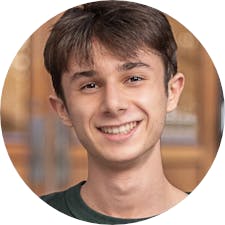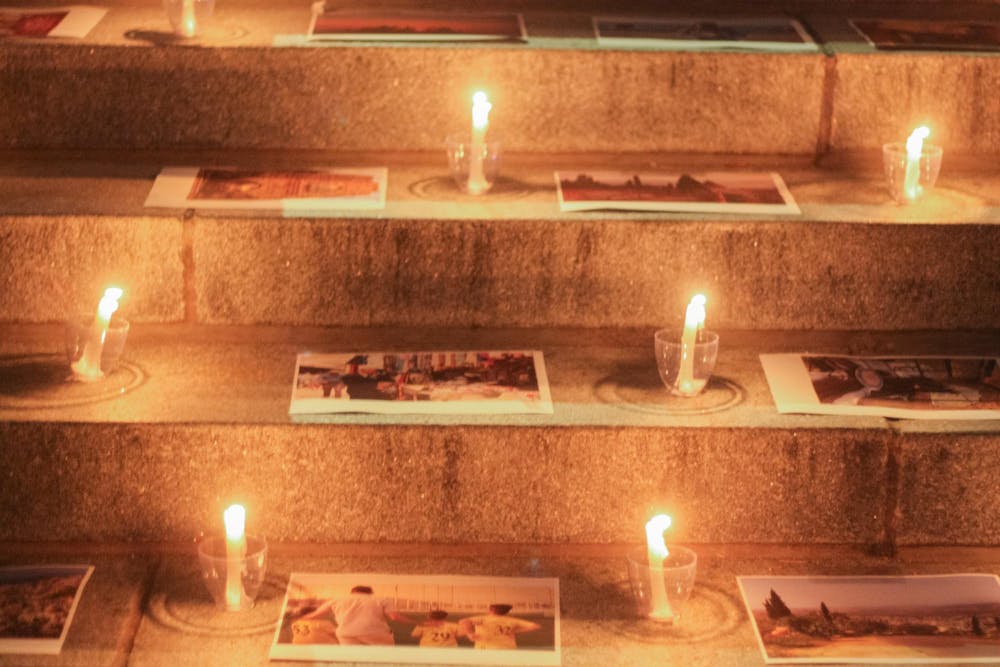Content warning: This article contains descriptions of violence and discussions of death.
On Wednesday evening, Brown community members gathered on the Main Green to light candles and recite Jewish and Muslim prayers to mourn victims of the recent escalation of violence in Israel and Gaza.
“This week has been an incredibly painful one for our Palestinian, Arab, Jewish and Israeli friends at Brown. It has been heart-wrenching and disturbing to witness what has been broadcast and shared with our world,” a vigil organizer said in a speech. “We wanted to make a space for our communities to stand together rather than let ourselves be divided.”
Wednesday’s vigil was organized by Talk for Tomorrow, a new campus group of anonymous Jewish, Israeli, Palestinian and Arab students at the University. Earlier this week, the group shared an open letter addressed to President Christina Paxson P’19 P’MD’20 which “unequivocally” condemned Hamas’s attacks on Israel as well as “Israel’s inexcusable acts in Palestine.”
The letter urged Paxson “to protect Palestinians and those advocating for Palestinian rights on campus” and to expand her response to the recent violence “to include the condemnation of the Israeli state’s inexcusable acts.”
On Oct. 10, Paxson wrote in a letter to the Brown community that “with this weekend’s horrific and devastating terrorist attacks by Hamas on Israel and the tragic loss of life that has ensued — including and especially the impact on civilians in both Israel and Gaza — my thoughts are with the individuals and families most directly impacted by the violence and those who remain in fear as the conflict persists.”
Paxson was in attendance at the beginning of Wednesday’s vigil but departed before its conclusion. University Spokesperson Brian Clark declined to comment on Paxson’s departure.
Wednesday’s vigil follows two separate Main Green vigils held last week, one organized by Brown-RISD Hillel and the Rohr Chabad House — which Paxson attended — and another by Students for Justice in Palestine, which she did not attend.
In response to the Oct. 7 attacks on southern Israel by Hamas militants, the Israeli military has launched continual airstrikes on Gaza and escalated its years-long blockade of the territory, almost completely cutting off food, water, fuel and electricity. On Wednesday, Israel agreed to let Egypt deliver limited humanitarian aid to Gaza.
Last Friday, Israel also ordered over a million civilians to evacuate northern Gaza ahead of an expected ground offensive. A United Nations spokesperson has called the order “impossible” and warned of “devastating humanitarian consequences.”
Hamas’s attacks on Israel have killed an estimated 1,400 people, and the group has taken more than 200 people hostage. Israel’s retaliatory attacks have killed more than 3,000 people in Gaza and wounded more than 12,000, the Wall Street Journal reported.
“We want to take the time to recognize that our Palestinian friends do not only come here to mourn the thousands who have been killed over the past 11 days, but the lives uprooted and taken since the Nakba of 1948,” another vigil organizer said in a speech.
Wednesday’s vigil included a two-minute moment of silence to “commemorate all who we have lost and will continue to lose,” an organizer said.
Early into the vigil, Reverend Janet Cooper Nelson, the chaplain of the University and director of the Office of the Chaplains and Religious Life, expressed that she felt “honored tonight by the work of the students who pulled (the event) together.”
Following Nelson’s speech, a Muslim student recited a passage from the Qur’an that is “often read when we are grieving and mourning for those we have lost,” and Hillel Rabbi Jason Klein shared a Jewish prayer for the dead.
Several vigil organizers shared anonymous testimonies from Palestinian and Arab students on campus about the emotional impact of the Israeli military’s retaliatory airstrikes on Gaza. Students also expressed fears over facing backlash and harassment for speaking out about the situation.
“This enduring grief is woven into my identity, as it is for all Palestinians who have endured, who have witnessed the endurance of over seven decades of suffering under the Israeli occupation,” wrote an anonymous Palestinian student in a statement shared by organizers. “My heart aches and breaks every day for those of us who are mourning the loss of their loved ones, struggling for their survival and panning their final words.”
“This week, despite being thousands of miles away from the war, the effects created waves that have followed me here on campus,” another anonymous Palestinian student statement read. “In Palestine, there’s an ever-present sense of vulnerability and suppression, feelings that unexpectedly recently resurfaced here at Brown.”
In a previous statement to The Herald, Clark reiterated the University’s commitment to “ensuring that Brown is safe and welcoming for all members of our community.” He wrote that students should refer to a letter sent by Vice President for Campus Life Eric Estes with resources for community members.
Clark previously wrote that “the Department of Public Safety remains the best immediate point of contact for anyone with a timely concern about personal safety.”
In an interview after the vigil, a student of Palestinian descent, who wished to remain anonymous for safety reasons, told The Herald that they “feel like there have been a lot of voices on both sides that haven’t been productive and have been focusing only on one side of the issue.”
“As a Palestinian, I wanted to show support for all lives on both sides,” they said.
Two Israeli-American organizers shared a statement at the vigil addressing how they’ve reacted to and processed the violence and criticisms of the Israeli government’s current and historic actions.
“The fear and despair was all-encompassing as footage came out of Hamas’s brutal attacks,” said one of the Israeli-American students. “The paralyzing fear, though, was not just for our families. It was also because we knew how Israel was going to respond.”
“The disturbing and mounting numbers of Palestinians killed and expelled in the past 75 years should be enough for us to call for this to end,” the student continued. “It has never been more clear that such a military occupation is dangerous for both the occupied and the occupier.”
Vigil organizers also acknowledged that some Palestinian students “feel underrepresented” in the letter the group delivered to Paxson.
“Many Palestinians, including (those) amongst us, wish we did not have to dilute our statements and avoid certain language,” a vigil organizer said in a closing speech at the vigil. “Unfortunately, however, this is the situation we find ourselves in.”
“It is sad and scary that we have to do so in order to convince people of our humanity,” they continued.
An organizer with Talk for Tomorrow, who wished to remain anonymous for safety reasons, told The Herald that the group believed it was “important for this to be a moment of unity” and that creating an inclusive space for all those who were mourning was a way to “call in” many students to their movement.
While the organizer said they were “grateful” that Paxson took the time to read the group’s letter and attend the vigil, they believed that Paxson “has not recognized the struggle of Palestinian people, and has also not centered any of the language of her emails and communication around Palestinian people.”
In an interview after the vigil, one student, who wished to remain anonymous for safety reasons, told The Herald that they came because they knew Paxson would be in attendance.
“I wanted to speak to her if I had a chance,” the student said, adding that they hoped to share with Paxson that Muslim students feel “uncomfortable” and “voiceless” as a result of the administration’s response to the violence.
Clark previously wrote in an email to The Herald that the administration, having received the letter from Talk for Tomorrow, will “read and consider the points they’ve shared.”

Sam Levine is a University News editor from Brooklyn, New York covering on-campus activism. He is a senior concentrating in International and Public Affairs.





